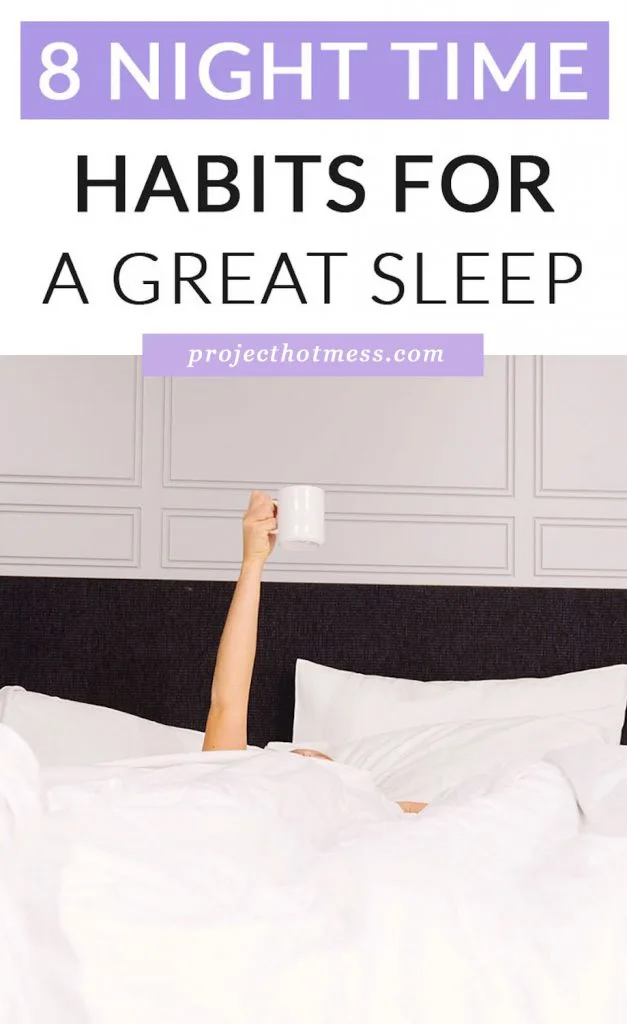If you’re reading this, it’s safe to assume it’s because you’re not getting enough sleep. We live in a demanding society that often values productivity over self-care, and it shows.
Since 1985, the number of adults who sleep for less than six hours each night increased by 31%. 70% of college students don’t get enough sleep, and 97% of teenagers are sleep deprived. These numbers are scary, since sleep is so vital to our well-being.
Lack of sleep has been connected to depression, car accidents, and prescription sleeping pill overdoses. It’s no exaggeration: sleep deprivation kills.
Fortunately, there are a few ways to increase the amount of sleep you get each night, along with the quality of sleep you get. Barring a sleep disorder, it may just take a few lifestyle changes to get a great night’s sleep!

1 – Use the Blue Light Filter on Electronics
Some laptops and smartphones have a nighttime filter that changes the screen to a warmer tint. This is a great tool, especially for people who use their phone as an alarm. Our electronics produce blue light, which is known to keep us alert during the day.
Even though our bodies produce melatonin at night to help us sleep, blue light disrupts this, keeping us awake for longer. Crank the filter on your electronics to the highest setting as your bedtime nears.
On an iPhone, you can set the filter to turn on automatically after a certain hour. You might see fewer restless nights!
2 – Don’t Drink Caffeine After 2:00pm
Studies have shown that in order to sleep well at night, you should stop drinking caffeinated beverages after 2:00pm, or seven hours before your bedtime.
This is because caffeine impacts our sleep, even if the effects of that coffee wore off hours before. Avoid consuming anything with caffeine within the seven hours before you plan to sleep. That means you should be steering clear of coffee, energy drinks, chocolate, non-decaf tea, certain headache medications, and anything on this list.

3 – Get a White Noise Machine
You might roll your eyes at the idea of listening to rainstorms and birds chirping at bedtime, but it works! That’s because white noise remains consistent, whereas other types of noise (snoring, dogs barking, etc.) changes suddenly.
In a study on newborns, researchers found that 80% of babies were able to fall asleep to white noise after just five minutes. You can get a white noise machine for your room, one for travel, and a white noise app on your smartphone. Do whatever works best for you!
4 – Keep Cool at Nighttime
Of course, you don’t want to be shivering from being too cold, so stay cool in moderation. That being said, temperature plays a role in our sleep quality. Becoming too warm or too cold while sleeping disrupts our REM sleep cycle.
Your thermostat temperature may help, but your mattress temperature matters even more. Foam mattresses are more likely to make you overheat at night than hybrid box spring mattresses, so your expensive memory foam mattress might actually be making your sleep quality worse.
To keep cool regardless of the kind of mattress you have, get breathable sheets and place a mattress pad on your bed (look for one with phase changing gel).

5 – Wake Up at the Same Time Every Day
We’ve all felt the urge to sleep in when we get an extra day off from work, but you’ll pay for it later! Waking up at the same time every day reinforces our circadian rhythm, or the times in which our bodies wake up and begin to shut down.
This just may be the solution for those who feel especially groggy on Monday mornings. Waking up at the same time every day makes it easier for us to fall asleep at night, improves our alertness, and has been linked to better immune system function.
Choose a reasonable hour (when you normally wake up for work) and give it a shot!
6 – Exercise in the Morning
Studies show that the best time to exercise is in the morning, since it reduces your nighttime blood pressure the most. It also gets you into a routine, which contributes to better sleep habits on its own.
Of course, not everyone can squeeze a morning workout into their schedules. Work may start too early for you to go to the gym, or you might just know that you can’t commit to forming this new habit.
If you can’t exercise in the morning, do the next best thing: don’t work out at night. Exercising releases adrenaline and endorphins, which in turn keep us awake. We obviously don’t want that!

7 – Cut Back on Naps
Sleeping during the day can confuse our internal clocks, making it harder to fall asleep at night. When we take naps, there’s a fine line between what’s beneficial and what’s harmful to our sleep cycle.
Taking a nap for 30 minutes or less has been shown to improve daytime brain function, but pushing that limit can cause daytime grogginess. If you need a nap to get through the day, set an alarm (or two) to make sure you don’t oversleep!
8 – Take a Melatonin Supplement
Taking cold medicine or prescriptions to fall asleep can be dangerous if accidentally misused. In 2011, 30,149 Americans were hospitalized for sleeping pill overdoses. It’s safer to opt for melatonin supplements, since melatonin is what our bodies naturally produce to help us fall asleep.
A study showed that taking 2mg of melatonin at bedtime improved their sleep quality and daytime energy. Melatonin can also be found in foot creams, so if you’re not keen on taking pills, look for bath and body products infused with melatonin.
The importance of high-quality sleep cannot be overstated. Far too many people lack the amount of sleep they need, and it’s affecting their health.
These tips for a better night’s sleep should help you to feel more alert during the daytime. If they don’t, consider seeing a professional for a sleep study to rule out other causes for your insomnia.
Evaluate which lifestyle changes will work for you, and put them into action!


